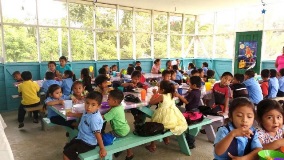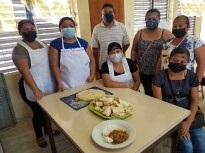Belize has a national school meal programme for vulnerable children managed by the Ministry of Education, and several other programmes managed by communities, faith-based organizations, NGOs, parent groups and other private providers. Some schools also operate cafeterias, canteens or tuckshops managed by vendors. There are menus to guide the preparation of the meals, but there are no compulsory nutrition standard for school food in the country.
Nutrition contents are delivered within the subjects of health and family life, science, physical education and social sciences. In addition to the curriculum, there are concrete extracurricular efforts that are promoted by the Ministry of Education, Culture, Science and Technology. Other initiatives are supported by the Ministries of Health and Agriculture, and specific projects with nutrition education components are supported by partners including FAO, UNICEF and NGOs.
School Food

Belize has a national school meal programme (known as the "School Feeding Programme") that targets eligible vulnerable schoolchildren from primary to secondary education. The programme is managed by the Ministry of Education, Culture, Science and Technology, with the support of the Ministry of Health for trainings, the Ministry of Agriculture for school gardening, as well as other partners like FAO, UNICEF and INCAP, providing technical as well as in-kind support in projects. In addition, the country has other school meal programmes managed by communities, faith-based organizations, NGOs, parent groups and other private providers.
Some schools also operate cafeterias, canteens or tuckshops managed by vendors.
The government-managed programme provides hot meals during lunchtime to children from public schools, about five days a week. The meals are prepared following a two-week menu cycle, which act as a guide, but is not rigid, as each school cook can adapt the menus according to local needs.
In 2017, The Ministry of Education in collaboration with FAO, UNICEF, PAHO, INCAP and the Mesoamerica Free of Hunger Initiative, developed a handbook of national menus to guide the preparation of meals in schools from six districts of Belize. As of 2022, this handbook is being revised to make it acceptable and applicable to the whole country, taking into consideration the cultural diversity and food particularities of each region.
The Ministry of Education provides training to the cooks, service providers, and teachers to ensure adequate implementation of the programme. These sessions, which are available for all schools, not only the ones included in the meal programme, cover topics like nutrition, health and hygiene, handwashing, food composition, gardening, waste management, and sanitation aspects, among others.
The Ministry of Education is responsible for monitoring the meal programme through occasional visits to check the conditions in which the food is served, handwashing practices, and the presence of vegetables on the menus, etc. The district education centers also play a role in identifying schools or communities that require specific health and nutrition services (e.g. deworming, supplementation, and dental services).
At present, there are no official nutrition standards that define or regulate the types of foods that are sold in and around schools in Belize, however, the government is working on developing a nutrition policy (2022-2030) as well as studying how to regulate the sale of sugar-sweetened beverages in and around school premises.
School-Based Food and Nutrition Education

In Belize, nutrition contents are delivered within the subjects of health and family life, science, physical education and social sciences. In addition to the curriculum, there are concrete extracurricular efforts that are promoted by the Ministry of Education, Culture, Science and Technology. Other initiatives are supported by the Ministries of Health and Agriculture, and specific projects with nutrition education components are supported by partners including FAO, UNICEF and NGOs.
| Main targets | Primary and secondary schoolchildren |
| Main educators | Teachers |
| Integration within the curriculum | Mainly as part of subjects of science, physical education and social sciences |
| Learning approach | Mostly knowledge-based |
Development
The nutrition contents are developed by the curriculum unit, also known as the quality assurance development service of the Ministry of Education, which is responsible for ensuring that the nutrition curriculum is delivered at all levels of education.
Implementation
Teachers are the main actors responsible for delivering nutrition contents through their specific subject curricula. Some of the most common topics covered include nutrient content of foods, etc.
In some schools, the Ministry of Education organizes health fairs and gardening workshops to reinforce these concepts, providing fruit trees and videos on how to manage the school gardens.
There are a few information materials, including a school health manual, that reinforce nutrition content and lessons, mainly focused on hygiene, gardening, preventing non-communicable diseases and fitness. Additional information materials, such as the Belize Food Basket and posters highlighting the nutritional value of some vegetables are disseminated to the districts, in hopes that they can be used by schools.
Teachers receive trainings as part of their continuous professional development where topics like nutrition, physical activity and prevention of non-communicable diseases are somewhat covered. Pilot projects linked to the school meal programme have provided trainings on nutrition education for a few teachers.
Monitoring and Evaluation
There is no monitoring and evaluation plan specific for school-based food and nutrition education in Belize.
Publications

Systematization of the Sustainable School Feeding Model and Proposition of Recommendations as Way Forwards to the Government of Belize
This document is aimed at presenting the systematization of the Sustainable Schools model pilot implementation in Belize, and it describes the implementation process of the pilot project, from its beginning in early 2016 to November 2018.
It is expected that this publication will contribute to the strengthening of the coordination among the sectors involved in school feeding and the institutionalization and sustainability of the school feeding policies in the country, so that, in the medium and long term, the school feeding program of Belize can contribute to food security and nutrition, the human right to food, as well as to the health and social development of its citizens.

Local Procurement From Family Farming for the School Feeding Program. The Experience of Belize
This guideline presents general recommendations for the adequate design, implementation, monitoring and evaluation of this component, trying to consider the realities of different school feeding programs in the Caribbean countries. At the same time, it presents some details on how the various steps of the process have been implemented in Belize, as part of the Sustainable Schools pilot project.
It is expected that this publication will contribute to a further integration of family farmers into the national school feeding program of Belize.
Articles

Hearty meals, healthy families
10/09/2021
It is lunchtime at the village school in Santa Cruz in the Toledo district of southern Belize, and there is a babble of noise and chatter as kids settle themselves down at the long trestle tables
News

